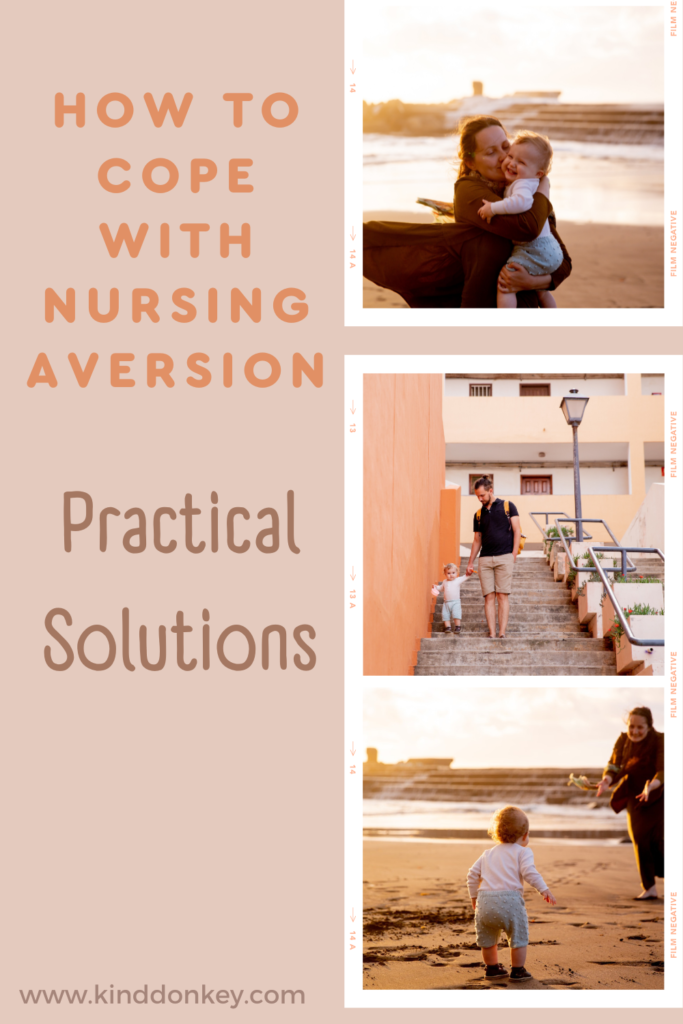I have had three babies in four years. I have been breastfeeding my kids many times a day for the last five years nonstop. I have gone through my second pregnancy while breastfeeding, and through my third while tandem breastfeeding. I’ve been breastfeeding babies during the night for the majority of those five years. Sometimes, I’ve hated breastfeeding with my whole being.
I’ve felt nursing aversion so bad that I could only think of biting myself. Certainly, people would think that weaning would be the immediate solution. But that is really difficult, and I’ve found ways to cope with nursing aversion that have allowed me to enjoy breastfeeding.
What does it mean to have nursing aversion?
Nursing aversion is a feeling of agitation that some breastfeeding parents feel when their child is latched. It is a normal response of your body to the overwhelming physical demands of motherhood. You feel the physical need to unlatch the baby. You want to be left alone for a while because breastfeeding feels like nails on chalk.
You want everyone to take their hands off of you, now!
It is a normal feeling, you are not alone, and it does not mean that you don’t love your family enough.
Why do I have nursing aversion?
Nursing aversion is usually related to hormonal changes. Many times it worsens with ovulation, pregnancy, and postpartum when you are tandem breastfeeding.
But even without the excuse of hormones, feeling touched out while breastfeeding is very understandable. Your body has gone through nine months of pregnancy, through childbirth, and now breastfeeding. It is very intense work for your body, usually accompanied by poor sleep and zero self-care. After a while, we need to regain some space and time for ourselves.
Not only are you caring for a baby or a small child, but your body is also constantly working to maintain a food supply for them. When you’re resting, you’re not really resting. A lot of new hormones are affecting your body and your mind.
Everything you once took for granted now comes with conditions.
Do you want to eat? Only if the little one is settled and happy. Do you want to sleep? Only if the little one is sleeping as well. You may not be able to wear any clothes you want because they should be breastfeeding-friendly. Maybe wearing your hair down is not practical enough when you have a baby that thinks your hair is a toy. You may not be able to eat whatever you want because of food allergies or some other issues with breastfeeding.
Your mind is always occupied with your baby and so is your body. You nurse your baby constantly and they are literally on top of you for a big part of the day. If you breastfeed at night, you don’t even get a break.
If you are breastfeeding during pregnancy or tandem breastfeeding, breastfeeding aversion is even more common.
It is a lot. It is difficult, and you are doing an amazing job at this!
On top of that, due to how our world works, it is very possible that you don’t have the support that you need.
Even if you are not breastfeeding, feeling touched out from the duties of parenthood is also understandable.
What are some ways to cope with nursing aversion?
Let your partner know how you are feeling

It is very normal to feel guilty if we feel any less than happy to sacrifice every part of our being for our family. This is unfair.
You are a very good mother and a person with personal needs. Supportive people that love you are going to be happy to listen to you and find a way to help you relieve some of those feelings.
If you have a partner, they may be missing physical touch from you. Maybe they don’t understand why and are feeling left out.
Explain to them how you are feeling. You are constantly being touched by your baby and are needed in many other physical ways. You need to get some extra time and space to yourself before you can offer any part of yourself to others.
Ask for help if they don’t offer it. Your partner can take care of the house, take care of the baby by themselves for a while every day so that you can rest completely. They can put them to bed every night so you don’t have to breastfeed them to sleep. There is always a way in which they can do more so you have to do less.
If you are doing this on your own, talk about this with a supportive friend, family member, or with a therapist. Get any help you can get because you deserve it.
Identify the times when the nursing aversion is less manageable
For some people like myself, this feeling is not constant, it comes and goes during the day.
I found, for example, that it was very difficult for me to breastfeed my toddler at night and right after waking up. So with a lot of help from my husband, we taught him to expect to breastfeed to sleep but then the next time would be after breakfast the next morning.
After a whole night of sleeping with enough personal space, I could happily go back to breastfeeding him several times a day.
I haven’t always been able to have that night’s rest. I have had babies on my boob all night for years. But breastfeeding at night became psychological torture once I got pregnant.
Establish some boundaries
If your most difficult time breastfeeding is when you are out and about, you can put the boundary of only breastfeeding at home. If it doesn’t feel right when the first thing your toddler says when they see you after some time is “boobie”, teach them that you talk and play first, then breastfeed.
Boundaries are good for everyone. And babies that don’t need to be breastfed so frequently for nutritional purposes are old enough to understand boundaries and benefit from them.
Offer loving touch in a way other than breastfeeding
Touch is very important for babies. If your baby doesn’t need the feeding for nutritional purposes, you can offer closeness and loving touch in different ways.
Many times babies want to be fed because they need to feel loved and cared for. There are many other ways to show love to little children.
You can babywear them and go for a walk, bathe with them, give them a massage, hold them to sleep… All those things are intimate and involve touch, but it is not the kind of touch that you feel when breastfeeding. Some of these kinds of touch may also feel pleasant to you.
Let go of your perfectionism

We all want to do the best we can in motherhood. Each of us in different ways, we have some expectations from ourselves that are many times excessive.
No one needs a spotless house. Every parent has made a mistake and not for that are we worse people or parents.
Focus on the things that are important and let go of everything else.
Nourish your body and mind in every way you can
Your body has gone and is going through a lot. It has been working very hard for a long time and it needs to be well taken care of.
It is very easy to forget about your most basic needs when taking care of a little one whose only need is you.
Drink enough water and eat enough good food to support your body through breastfeeding and the other physical demands of motherhood. Do some kind (any kind) of exercise that makes you feel good. Improve your sleep in any way you can. Be forgiving to yourself.
Try to reduce your stress levels
I know it is easier said than done. Stress is terrible for our brains and general health.
Find something that makes you feel relaxed and taken care of and do it every day. It doesn’t have to be extravagant. And also taking care of yourself shouldn’t become another thing on your to-do list that makes you feel guilty if you don’t do it.
If going to the gym makes you feel good, do it. If it makes you feel overwhelmed, do something else. Meet with a friend regularly. Even just walk to a cafeteria while your baby sleeps on the stroller and have a warm drink in peace. Anything that makes you feel good is important.
Having some stress-reducing mechanisms should make any situation better.
Reduce breastfeeding or wean and don’t feel guilty about it
Lastly, don’t feel guilty because you are not. No one has a right to your body. Not even your baby, even though we sometimes are made feel like our body is not our own.
If this is too difficult and doesn’t let you be happy, stop it. You are incredible, you want the best for your baby and you are going to give them the best you can.
If the best you can is a happy mom and formula, great!

I would love to know some other ways to help reduce the feeling of being touched out while breastfeeding. Have you ever felt this way? Did it go away or did you change something to make it better?
This post may have some affiliate links. This means if you click on the link and purchase the item, I will receive a commission at no extra cost to you. All opinions are my own.